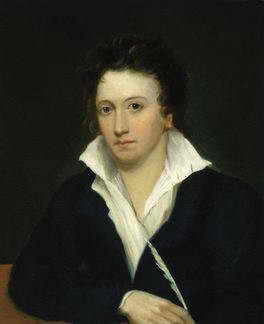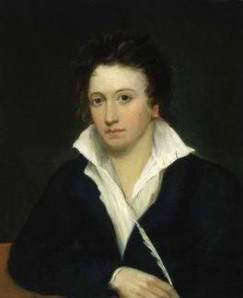Bring Back the Poets

by Andrew Swensen
“And whether it [poetry] spreads its own figured curtain or withdraws life’s dark veil from before the scene of things, it equally creates for us a being within our being. It makes us the inhabitants of a world to which the familiar world is chaos.” — Shelley
Poetry. We seem to view poetry nowadays as if it dwells singularly in the province of pretentious intellectuals, academic institutions, and (if we are lucky) the occasional 11th-grade English classroom. I find this development sad. For some reason we think that poetry is inaccessible, a rarefied highbrow art form expressed in overwrought language. Consider instead the thoughts of Stanley Kunitz: “”Poetry is ultimately mythology, the telling of stories of the soul. The old myths, the old gods, the old heroes have never died. They are only sleeping at the bottom of our minds, waiting for our call. We have need of them, for in their sum they epitomize the wisdom and experience of the race” (Writer’s Almanac, July 29, 2011).

Percy Bysshe Shelley by Alfred Clint, after Amelia Curran, and Edward Ellerker Williams (National Portrait Gallery, London)
I believe in beautiful language, and I have no problem with poets who ornament their expressions with sound devices, colorful figures, and rich imagery. Yet poetry even of the most lyric sort should not elude us. Poetry is among our earliest art forms, our most democratic and populist, and I think it is time that we stand up for the art of magnificent words. If you think about the birth of the arts from back in the days when we were sleeping under the stars and keeping warm by open fires, we were on those nights also practicing our most primal elements of culture: dance, song, some basic rhythms for music, and yes, speaking or chanting poetry to one another. Now we have arrived in the 21st century, and we seem to have neglected our origins under the open sky. Bring back the poets, I say.
I was recently reading Mary Oliver. Mary Oliver has won two of the most prestigious prizes that a poet can win, the Pulitzer Prize and the National Book Award. But who knew? This lack of knowledge is not some crime against culture or a reason to scold the unknowing. No, for me it represents something sadder, an opportunity lost for people to meet this magnificent talent creating a wholly accessible art form. If you know nothing of Mary Oliver, then let today be the day to change that, through some lines from her poem “White Flowers”:
Last night
in the fields
I lay down in the darkness
to think about death,
but instead I fell asleep,
as if in a vast and sloping room
filled with those white flowers
that open all summer,
sticky and untidy,
in the warm fields.
When I woke
the morning light was just slipping
in front of the stars,
and I was covered
with blossoms.
Beautiful. Yet not only beautiful, the poem is simple and accessible. There is no reason why one can not have this lyricism enliven two minutes of their day, and what a gift that would be. As the Poetry Foundation biography of her states (a wonderful online resource), “Oliver’s verse focuses on the quiet of occurrences of nature: industrious hummingbirds, egrets, motionless ponds, ‘lean owls / hunkering with their lamp-eyes.’”
Let’s turn our attention to Pittsburgh. By our general neglect of poetry, we are overlooking some of the richest artistic offerings to be found in our own city. Consider the case of Richard St. John. This poet has a special talent for turning a phrase such as what we read in his “Circling Walden Pond”:
Why do we come, drawn as if to find
our hearts’ true north? As if Thoreau had mapped
this quiet clearing and this pond, not here
among the maples and scattered pine,
but somewhere at the furthest reach
of our imagination, yet close as Concord.
The words have such richness, and the work conveys a special emotional, reflective poignancy. However, like Mary Oliver, St. John delivers his art in fully accessible terms. There is nothing here that should discourage us, that should frighten us off from the wonderful world of poetry. I recently walked around Walden Pond myself, and I made sure to take Mr. St. John’s fine thin volume in hand as I did. An unforgettable moment.
Are you convinced yet?
Rick is not only a talented poet; he is a talented Pittsburgh poet who can be found reading regularly about town. For free, no less. Furthermore, while I maintain my local pride in Pittsburgh artists, excellent poets are to be found around the country and around the world, and like Rick they are reading their work in many places (and TMD will gladly share any posts about poets and reading venues among your favorites!).
So my final thought is to encourage you to support the effort of some local artists endeavoring to make us think a bit more, to make us savor the sweetness of this life. One of the nice things about poetry is its compactness, portability, and its ease of use — its ability to travel with you as opposed to you going to a theater or gallery. Yes, folks, art that fits in your pocket. To get you started, let’s give a shout for Rick and for Autumn House, and two recommendations. For a wonderful volume, one resting next to my bed as I write these words, buy yourself a copy of The Pure Inconstancy of Grace by Richard St. John, a collection that includes “Circling Walden Pond” and an outstanding gathering of other work. Rick may not be a legend yet, but we should start trying now (a very affordable $14.95 from Truman State Press, click here).
Then to support our arts institutions as well as our artists, consider adding The Autumn House Anthology of Contemporary Poetry to your collection ($34.95, at www.autumnhouse.org). Autumn House represents yet another wonderful Pittsburgh arts organization, and one to which we give too little attention. Yes, we have right here in our fine city a publisher of superior literature, and we are the richer for it. If you know nothing of contemporary poets, let Autumn House be your guide. Open to a page, and start reading. Finally, I recommend one more option available by the wonders of our modern age, for poetry like the rest of the world has taken to electronic communication. American Public Media, with host Garrison Keillor, produces an excellent program The Writer’s Almanac with a new poem every day and great website, where you can even subscribe to have your daily installment of poetry sent directly to your email (www.writersalmanac.publicradio.org).
Reclaim poetry — art that can be savored anywhere.
_____
Other links of interest in The Muse Dialogue:
The table of contents for our issue The Case for Poetry in Our Age
“Aesthetic Judgment and the Modern Era” also by Andrew Swensen











Poets fill our lives in ways little else can. Lyrics like those by Rick St. John are moving and captivating in their use of words and images. Keep poetry in your life and share it with others!
Many thanks for the thoughts, and yes, keep sharing poetry with every chance you get!
Thank you for your enthusiasm for poetry in general & Pittsburgh poetry in particular. Thank you for the various links to other resources that we all should have and read regularly. Thank you for the encomium for Rick St.John — a deserving poet.
And thank you, David, for your feedback. Please do share The Muse Dialogue with others. We are trying to build something here that draws attention to the arts and to artists like Rick. All the best to you.